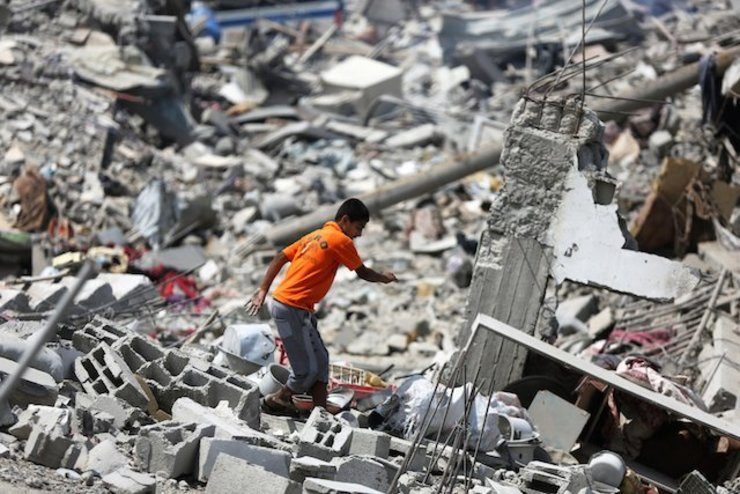SUMMARY
This is AI generated summarization, which may have errors. For context, always refer to the full article.

GAZA CITY – A fragile ceasefire in the Gaza Strip entered a second day Wednesday, August 6, as Israeli and Palestinian delegations prepared for crunch talks in Cairo to try to extend the 72-hour truce.
The ceasefire, which came into effect Tuesday, August 5, has brought relief to both sides after one month of fighting killed 1,875 Palestinians and 67 people on the Israeli side.
Delegations are now ready for what are expected to be tough talks aimed at securing a permanent ceasefire after the three-day window closes.
Officials on both sides confirmed sending small teams to Cairo, but they bring conflicting demands and face an uphill diplomatic battle.
The Palestinians insist that Israel end its 8-year blockade of Gaza and open border crossings, while Israel wants Gaza fully demilitarized.
But after the longest period of quiet since fighting began on July 8, Palestinian foreign minister Riyad al-Malki said he expected “the ceasefire to expand into another 72 hours and beyond”.
The United States is also due to take part in the talks.
“We are determining at what level and in what capacity and when,” State Department spokeswoman Jen Psaki told reporters in Washington.
US Secretary of State John Kerry, in a BBC interview, called for a sustained ceasefire but stressed that the crucial wider issues will need to be addressed.
“How are we going to make peace? How are we going to eliminate these rockets? How are we going to demilitarize and move towards a different future?” he asked.
On the first day of the truce in Gaza City, people came out in numbers, children played on the street and some shops reopened for the first time in days.
Others ventured home only to find utter devastation.
“What am I going to tell my wife and children? I don’t want them to see this! They will go crazy,” said Khayri Hasan al-Masri, a father of three who returned to his heavily damaged home in Beit Hanun in the north after fleeing when Israel’s ground offensive began on July 17.
Relief, skepticism
Israel’s security cabinet met to discuss a long-term ceasefire, but broke up without any public statement.
In southern Israel, there was relief but skepticism.
“I never trust Hamas,” said Orly Doron, a mother living in a Gaza border kibbutz that has been battered by rocket fire.
“We had three or four ceasefires during this war; we all saw they weren’t kept.”
A poll published by Israeli daily Haaretz Wednesday said a majority of Israelis thought “nobody” had won the conflict in Gaza.
Asked “Following the ceasefire, how would you describe the results of Operation Protective Edge?”, 51% of those who took part said neither side had won.
Another 36% said they thought Israel had won, and just 6% thought Hamas had emerged victorious.
It is the second time in 4 days the two sides had agreed to observe a 72-hour humanitarian truce. The previous attempt on August 1 – brokered by Washington and the UN – was shattered after just 90 minutes.
The new ceasefire, announced by Egypt late on Monday, August 4, is the longest lull since fighting began.
This time Israel has withdrawn its troops, ending the ground operation aimed at destroying Hamas’s tunnels.
Army spokesman Lieutenant Colonel Peter Lerner said troops would respond to any truce violations.
Israeli Brigadier General Guy Goldstein, deputy head of the unit responsible for civilian affairs in the Palestinian territories, said more than 250 trucks of supplies entered Gaza on Tuesday.
$6B in damage
The Palestinian health ministry said 1,875 Palestinians had been killed during the conflict, including 430 children, and said 9,567 people had been wounded, including 2,878 children.
In the West Bank city of Ramallah, deputy economy minister Taysir Amro said the 29-day war had caused total damage of up to $6 billion (4.5 billion euros).
Some of the worst devastation is near the southern Gaza city of Rafah, which was flattened in a massive Israeli assault that began on Friday, August 1.
The United States and the United Nations have welcomed the truce, saying the onus was on Hamas to keep its part of the deal.
Israel has been subject to increasingly harsh criticism over civilian casualties in Gaza.
A British parliamentary committee report said Wednesday excessive Israeli restrictions on Palestinian territories cannot be justified on the grounds they protect the Jewish state.
The Israeli army says it destroyed 32 cross-border tunnels, struck nearly 4,800 targets and killed 900 Palestinian “terrorists”.
“We expect that they still have about 3,000 rockets left. This is a challenge we have to address,” Lerner said. – Rappler.com
Add a comment
How does this make you feel?





There are no comments yet. Add your comment to start the conversation.